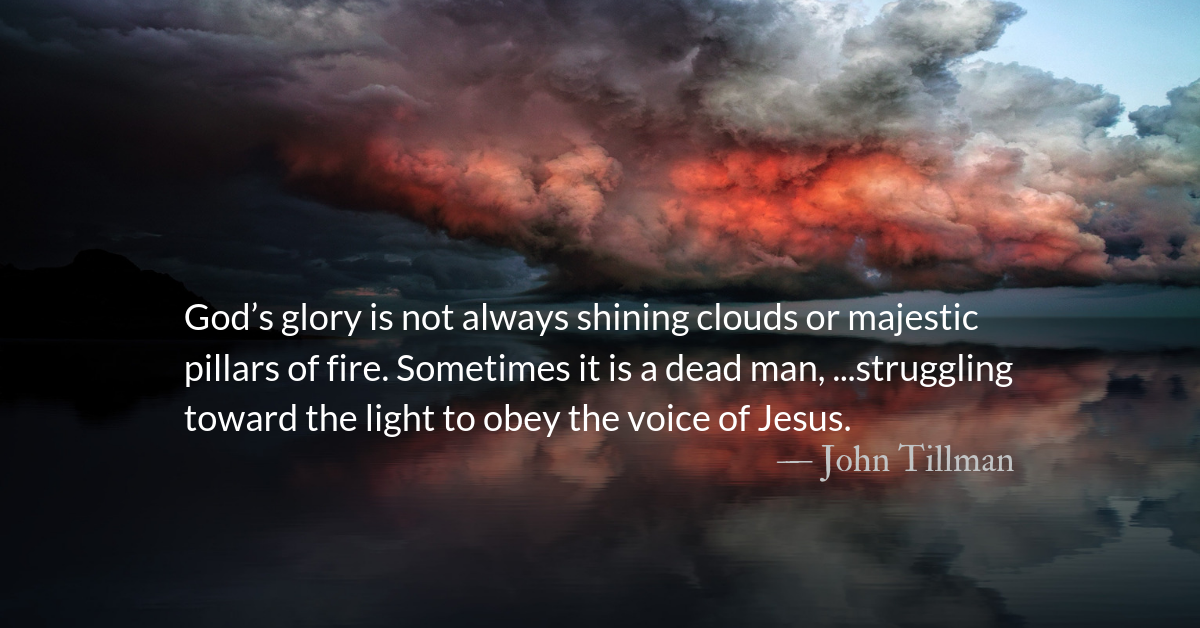John 11.40
Then Jesus said, “Did I not tell you that if you believe, you will see the glory of God?”
Reflection: The Staggering Dead and the Glory of God
By John Tillman
We do not know when exactly Jesus told Martha that by believing, she would see the glory of God. Perhaps while waiting for Mary to join them. Perhaps during the walk to the tomb. Perhaps it was at an earlier visit. Whenever he told her this, it was a bold claim.
Glory was a general term for splendor and greatness. Jesus used this same word when comparing Solomon’s clothing to that of a flower of the field. But seeing God’s glory was not the same as seeing the glory of the flowers or the glory of an earthly king’s power and wealth.
It is in tomorrow’s reading from Exodus 33, that Moses asks to see God’s glory. His desire is only partially granted. Moses, the dedicated servant of God and archetypal messianic forerunner of Christ, is given only a glimpse of God’s glory passing by. Later on in Exodus, when God’s glory fills the Tabernacle, the priests had to stop working and leave the area. When seeing God’s glory, holy prophets of old hid their faces, fell to the ground, and confessed their sins. God’s glory is terrifying in its beauty. Mary and Martha see it not peeking from the cleft of a rock, but directly, and in a shocking manner.
The glory that Jesus sets out to show Martha and Mary is at first terrifying for the sisters. The gruesome realities of death are on Martha’s mind as she warns Jesus about the bad odor that will have developed over four days.
God’s glory is not always shining clouds or majestic pillars of fire. Sometimes it is a woman holding her nose against the smell of death, being surprised by the sounds of life. Sometimes God’s glory is a dead man, blindfolded and bound hand and foot, struggling toward the light to obey the voice of Jesus.
Just as John calls the blind man “the blind man” after his healing, he reports the “the dead man” came out of the grave. In this world, we may never completely escape the identity of what Christ saves us from. We are never not “sinners,” but we are to be ever staggering, struggling toward the light, toward Christ’s voice.
One day, as Lazarus and our dear Christ, himself, our grave clothes will be untied (or “set aside” lyō in Greek). We will leave our grave clothes behind. That is the glory of God.
Prayer: The Request for Presence
Show us the light of your countenance, O God, and come to us. — Psalm 96.9
Today’s Readings
Exodus 32 (Listen – 5:47)
John 11 (Listen – 6:37)
Thank You!
Thank you for reading and a huge thank you to those who donate to our ministry, keeping The Park Forum ad-free and enabling us to continue to produce fresh content. Every year our donors help us produce over 100,000 words of free devotionals. Follow this link to support our readers.
Read more about Setting Aside the Scriptures
The Greek word translated “set aside,” (lyō) carries an implication beyond not ignoring the parts of the Bible we don’t like. It refers to unbinding or untying things bound together for a purpose. This would include untying the thongs of sandals (as used by John the Baptist), loosening bandages (as used by Jesus regarding Lazarus) or even the bonds of marriage (as referenced by Paul).
https://theparkforum.org/843-acres/setting-aside-the-scriptures
Read more about The Gospel is an Uprising
May Jesus, the strong man, the liberator, free us to see, to hear, and to speak.
May he kick open the gates of what paralyzes us and lead us out to do his work in the world. May we join the Uprising.







